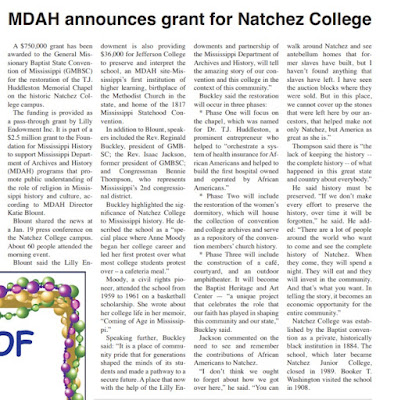This story appears on page 2A in the January 25, 2023,
issue of Concordia Sentinel (Ferriday, La.).


MDAH announces $750,000 grant for historic Natchez
College
Funding will be used to restore T.J. Huddleston Memorial
Chapel
NATCHEZ, Miss. -- A $750,000 grant has been awarded to
the General Missionary Baptist State Convention of Mississippi (GMBSC) for the
restoration of the T.J. Huddleston Memorial Chapel on the historic Natchez
College campus.
The funding is provided as a pass-through grant by Lilly
Endowment Inc. It is part of a $2.5 million grant to the Foundation for
Mississippi History to support Mississippi Department of Archives and History
(MDAH) programs that promote public understanding of the role of religion in
Mississippi history and culture, according to MDAH Director Katie Blount.
Blount shared the news at a Jan. 19 press conference on
the Natchez College campus. About 60 people attended the morning event.
Blount said the Lilly Endowment is also providing $36,000
for Jefferson College to preserve and interpret the school, an MDAH
site-Mississippi's first institution of higher learning, birthplace of the
Methodist Church in the state, and home of the 1817 Mississippi Statehood
Convention.
In addition to Blount, speakers included the Rev.
Reginald Buckley, president of GMBSC; the Rev. Isaac Jackson, former president
of GMBSC; and Congressman Bennie Thompson, who represents Mississippi's 2nd
congressional district.
Buckley highlighted the significance of Natchez College
to Mississippi history. He described the school as a “special place where Anne
Moody began her college career and led her first protest over what most college
students protest over – a cafeteria meal.”
Moody, a civil rights pioneer, attended the school from
1959 to 1961 on a basketball scholarship. She wrote about her college life in
her memoir, "Coming of Age in Mississippi."
Speaking further, Buckley said: “It is a place of
community pride that for generations shaped the minds of its students and made
a pathway to a secure future. A place that now with the help of the Lilly
Endowments and partnership of the Mississippi Department of Archives and
History, will tell the amazing story of our convention and this college in the
context of this community.”
Buckley said the restoration will occur in three phases:
* Phase One will focus on the chapel, which was named for
Dr. T.J. Huddleston, a prominent entrepreneur who helped to “orchestrate a
system of health insurance for African Americans and helped to build the first
hospital owned and operated by African Americans.”
* Phase Two will include the restoration of the women’s
dormitory, which will house the collection of convention and college archives
and serve as a repository of the convention members’ church history.
* Phase Three will include the construction of a café,
courtyard, and an outdoor amphitheater. It will become the Baptist Heritage and
Art Center – “a unique project that celebrates the role that our faith has
played in shaping this community and our state,” Buckley said.
Jackson commented on the need to see and remember the
contributions of African Americans to Natchez.
“I don’t think we ought to forget about how we got over
here,” he said. “You can walk around Natchez and see antebellum homes that
former slaves have built, but I haven’t found anything that slaves have left. I
have seen the auction blocks where they were sold. But in this place, we cannot
cover up the stones that were left here by our ancestors, that helped make not
only Natchez, but America as great as she is.”
Congressman Thompson said there is “the lack of keeping
the history -- the complete history -- of what happened in this great state and
country about everybody.”
He said history must be preserved. “If we don’t make
every effort to preserve the history, over time it will be forgotten,” he said.
He added: “There are a lot of people around the world who want to come and see
the complete history of Natchez. When they come, they will spend a night. They
will eat and they will invest in the community. And that’s what you want. In
telling the story, it becomes an economic opportunity for the entire community.”
Natchez College was established by the Baptist convention
as a private, historically black institution in 1884. The school, which later
became Natchez Junior College, closed in 1989. Booker T. Washington visited the
school in 1908.

No comments:
Post a Comment